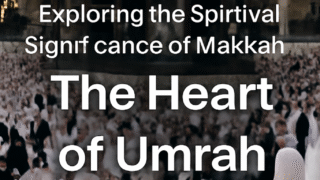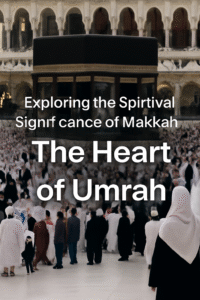Exploring the Spiritual Significance of Makkah: The Heart of Umrah
Introduction: Hook
Makkah, the holiest city in Islam, holds profound spiritual significance for every Muslim, especially during the pilgrimage of **Umrah**. But what makes Makkah so special? Why do millions of Muslims from all over the world flock to this sacred city every year? In this article, we explore the deep spiritual connection Muslims share with Makkah, and how it forms the heart of their Umrah experience.
1. The Sacredness of Makkah: Why It’s the Heart of Umrah
**Makkah** is not only the birthplace of the Prophet Muhammad (PBUH) but also the site of the **Kaaba**, the most sacred structure in Islam. Pilgrims visit Makkah to perform **Tawaf**, walking around the Kaaba seven times in a counterclockwise direction, as part of their Umrah rituals. But the true significance of Makkah goes beyond the rituals; it is about reconnecting with Allah, the Creator, and following in the footsteps of the Prophets.
2. Makkah and the Kaaba: A Symbol of Unity
The **Kaaba** is the focal point of **Makkah**, and the first sight a pilgrim sees when they arrive at **Masjid al-Haram**. This black cube structure is not just a building; it is the **symbol of unity** for all Muslims. Pilgrims, regardless of their nationality, race, or background, all face the Kaaba during their prayers. This symbolizes the unity of the Ummah (Muslim community) and their submission to Allah.
3. The Spiritual Benefits of Visiting Makkah for Umrah
Visiting Makkah and performing Umrah is a deeply spiritual experience. Here are some of the **spiritual benefits** of performing Umrah in Makkah:
- Purification of the Soul: Umrah is a chance to purify oneself spiritually. The act of walking around the Kaaba and performing the Sa’i ritual between Safa and Marwah is symbolic of the **struggles and perseverance** of Prophet Ibrahim’s wife, Siti Hajar.
- Renewal of Faith: The experience of being in Makkah strengthens your **connection with Allah** and brings you closer to the essence of Islamic teachings.
- Forgiveness of Sins: It is said that a pilgrim who performs Umrah with sincerity and devotion will have their **sins forgiven**, making this journey a spiritual cleansing.
4. The Rituals of Umrah in Makkah
Performing **Umrah** in Makkah involves several key rituals:
- Ihram: Before entering Makkah, pilgrims enter the state of **Ihram**, a state of spiritual purity, which signifies their commitment to performing Umrah.
- Tawaf: Walking around the Kaaba seven times in a counterclockwise direction while making du’a (prayers).
- Sa’i: Walking between the hills of Safa and Marwah, commemorating the journey of Siti Hajar in search of water for her son, Prophet Ismail.
- Tahalul: Shaving the head (for men) or cutting a portion of hair (for women) to mark the completion of Umrah rituals.
5. The Emotional and Psychological Impact of Makkah
Many pilgrims report an overwhelming sense of **peace and tranquility** when they visit Makkah. The act of performing Tawaf and standing in the Masjid al-Haram evokes **spiritual emotions** that help calm the soul. Makkah provides a sanctuary where one can disconnect from the chaos of the world and focus entirely on Allah.
6. Conclusion: Makkah’s Place in the Heart of Every Muslim
Makkah holds a unique place in the heart of every Muslim. It is not just the birthplace of the Prophet but the center of the Islamic world, where millions of pilgrims gather each year to perform **Umrah** and connect with Allah. The rituals performed in Makkah help to purify the soul, renew faith, and bring about a sense of peace and unity among Muslims worldwide.
Call to Action: Ready to start your **spiritual journey to Makkah**? Click [here](https://bismillahmekah.blogspot.com) to explore more about **Umrah**, **Hajj**, and how to prepare for this once-in-a-lifetime pilgrimage.

